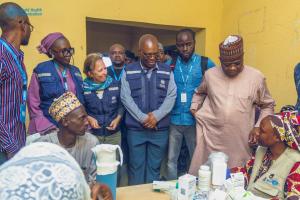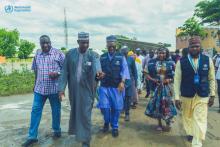WHO pledges support to flood-displaced persons in Borno State as health facilities affected.
Maiduguri, 14 September, 2024 –Following severe flash floods that displaced thousands and caused significant damage across multiple communities in Maiduguri, the capital of Borno State, the World Health Organization (WHO) Representative in Nigeria, Dr. Walter Kazadi Mulombo, pledged the organization’s unwavering support to those affected.
During his visit to Maiduguri, Dr. Mulombo met with key figures, including the Governor of Borno State, Professor Babagana Umara Zulum, the Shehu of Borno, Alhaji Garbai El-Kenemi, officials from the Ministry of Reconstruction, Rehabilitation & Resettlement, as well as representatives from the University of Maiduguri Teaching Hospital and Internally Displaced Persons (IDP) camps. In these discussions, he reaffirmed WHO’s commitment to supporting Borno in addressing the health challenges brought on by the recent floods.
Accompanied by the Borno State Commissioner of Health and Human Services, Professor Baba Mallam Gana, Dr. Mulombo assessed the situation in flood-displaced communities, including the Bakasi and Yerwa IDP camps, where many displaced people have sought refuge.
Dr. Mulombo expressed deep concern over the impact of the disaster on the lives of the affected population, especially the most vulnerable, including women, children, and the elderly. He assured the people of Borno State that WHO would continue to provide critical technical and operational support to mitigate the health impacts of the floods.
The flooding, caused by the breach of the Alu Dam, displaced over one million people and significantly increased health risks such as cholera and other waterborne diseases. This has further exacerbated the already challenging humanitarian situation in the state. Additionally, the flood affected the WHO National Polio Laboratory located at the University of Maiduguri Teaching Hospital (UMTH).
"On behalf of WHO, I extend my heartfelt sympathy to the people of Borno State affected by this devastating flood. WHO stands with you during this difficult time, and we are committed to ensuring that essential health services reach those in need, particularly those displaced by the crisis," said Dr. Mulombo. "We are shocked by the scale of the disaster, but we are here to assess the needs and support both the state and federal governments in addressing the challenges posed by this sudden emergency."
Dr. Mulombo reiterated WHO’s dedication to collaborating with the Borno State government and other partners to prioritize the health and well-being of affected populations.
In partnership with the Borno State Ministry of Health, WHO and its partners have been actively addressing the health challenges posed by the floods. WHO is closely collaborating with health authorities to strengthen disease surveillance, ensure the prompt delivery of medical supplies, and prevent outbreaks of waterborne diseases.
As part of its immediate response, WHO has deployed four mobile clinics to IDP camps and provided essential medicines and medical supplies, including Interagency Emergency Health Kits (IEHKs) and malaria treatments. Furthermore, WHO is working to enhance the state's capacity to rapidly detect and respond to disease outbreaks within the camps.
Expressing gratitude to WHO for its ongoing support in responding to the flood emergency, Professor Gana stated, "We appreciate WHO’s swift response and continued efforts to address the health needs of our people. As we focus on immediate relief, we must also prioritize building stronger health systems that can withstand future challenges posed by disasters like this."
While guiding the WHO team through the state capital, Professor Gana highlighted that the flooding is the most severe the region has experienced in the past 30 years. He reported that 14 health facilities had been affected and thousands of people displaced.
The Commissioner emphasized that the immediate needs of the people include shelter, Water, Sanitation, and Hygiene (WASH), food, and health services. He urged partners to assist the government in addressing these urgent needs, while the government continues its efforts to ensure that people can return to their homes as soon as possible.
In his remarks, the Shehu of Borno expressed his appreciation to both the government and WHO for their prompt support to the affected populations. He also called on the government to implement a lasting solution to prevent future breaches of the dam.
WHO’s involvement, alongside health partners, forms part of a broader commitment to supporting the Borno State government in addressing the health impacts of emergencies such as floods, disease outbreaks, and other humanitarian crises. As part of this ongoing support, WHO has deployed emergency health teams to flood-affected areas to conduct risk assessments, deliver health education, and enhance surveillance systems to detect and prevent disease outbreaks, including cholera and malaria.
These floods come at a time when Borno State is already grappling with a complex humanitarian crisis driven by years of conflict and displacement. The WHO Country Representative’s visit and the Organization’s steadfast commitment to supporting the state highlight the critical need for sustained health interventions in such challenging humanitarian settings.
WHO's efforts in Borno State are aligned with its global mandate to provide technical leadership and guidance in emergencies, ensuring that vulnerable populations continue to have access to life-saving health services, even in the most difficult circumstances.





